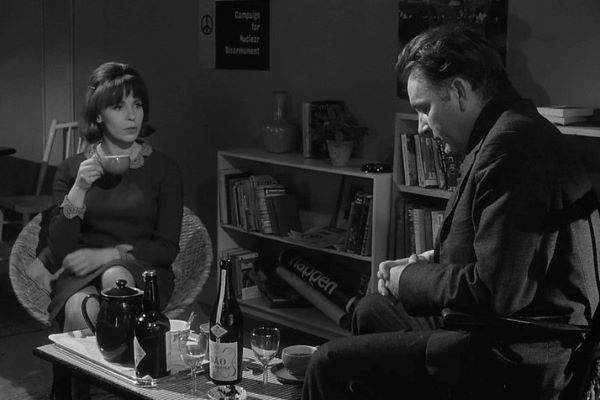With the recent passing of the legendary John le Carré, a handsome reissue of the first great screen adaptation of his work is very welcome. A sour and bracing counterpoint to the glamorous fantasy of James Bond, the world of The Spy Who Came in from the Cold is murky, dour, and depressingly plausible. Both novel and film trash completely the notion of the Cold War being a straight fight between ‘good’ and ‘evil’, as ideals are warped and hammered into a sharp and vicious will to win at any cost. It’s a thoroughly bleak experience, riddled with self-loathing and contempt like a buckled corpse under the bland eye of a guard tower spotlight. But it’s one of the finest and most compelling depictions of espionage ever put on screen, featuring perhaps Richard Burton‘s greatest performance as its self-destructive anti-hero.
Alec Leamas (Burton) is recalled to London after the final operative under his supervision in West Berlin is killed attempting to cross from East to West through Checkpoint Charlie. While it appears he has been dishonourably discharged from MI6, in reality the dishevelled, alcoholic Leamas is being groomed to attract the attention of East German intelligence. They see him as a potential defector, not least due to a new relationship with Nan Perry (Claire Bloom), an idealistic member of the British Communist Party. Meanwhile Leamas is intent on tracking down the elusive Mundt (Peter van Eyck), the agent responsible for the annihilation of Leamas’ Berlin unit.
Burton navigates the film’s fiendish plot in a perpetual slouch, hunched and braced against everything, as if the chill of the conflict is literal. He negotiates every pitfall with the doomed air of a broken man shuffling to the gallows, unwilling to resist his own annihilation. Espionage in his world is conducted by bland men in blander locations, fateful decisions reached with the same mundane bureaucracy as a librarian issuing a fine for a book returned a day late. He hates it, and himself even more. It’s a far cry from Burton’s grandstanding, Oscar-nominated Becket of the year before. It’s more like his lacerating performance in Who’s Afraid of Virginia Woolf, with the hatred intensified to a blue flame and directed inward. It is mesmerising to watch.
But Leamas is simply the novelist and the director’s disillusioned viewpoint made flesh and pickled in whisky. Even though the novel and film came at a time when the conflict was ratcheting in intensity (the Berlin Wall itself was still being revised and reinforced at the time of its release), the story seems preternaturally aware of the pointless nature of its internecine, mutually-assured hostilities and redundant superpower posturing. Ritt’s film is steeped in a bitter fatalism, to which a half century of hindsight has merely added a crust of wry bathos. Nothing is clear-cut, and there are no heroes. Ritt himself had been blacklisted in the ’50s and this experience is palpable, particularly in Nan, whom Leamas admires for the passion long extinct in himself, but also semi-despises for her naivete. One also suspects the casting of Sam Wanamaker, who had made a speech in support of the ‘Hollywood Ten‘, and had been in self-imposed exile in the UK for 13 years by the mid-’60s, was no accident.
Ultimately, The Spy Who Came in from the Cold can be characterised as a film of furious restraint. At first glance it offers little reward for the concentration required to negotiate the complexities of it plot, and there are no explosive showdowns or rousing set pieces. No monstrous Minotaur exists at its labyrinthine heart to be vanquished. No Goldfinger. No Blofeld. Instead is the horrendous, but blackly comic, realisation that none of it matters. It’s easy for us to reach that conclusion more than three decades after the Wall crumbled. But for le Carré to realise that at the time, and for Ritt to translate this feeling to film with such brutal clarity, required a certain kind of genius. It is a dense, tortuous and dispiriting watch, but perfect in its own cynical way.
Available on Blu-ray from Mon 17 May 2021
